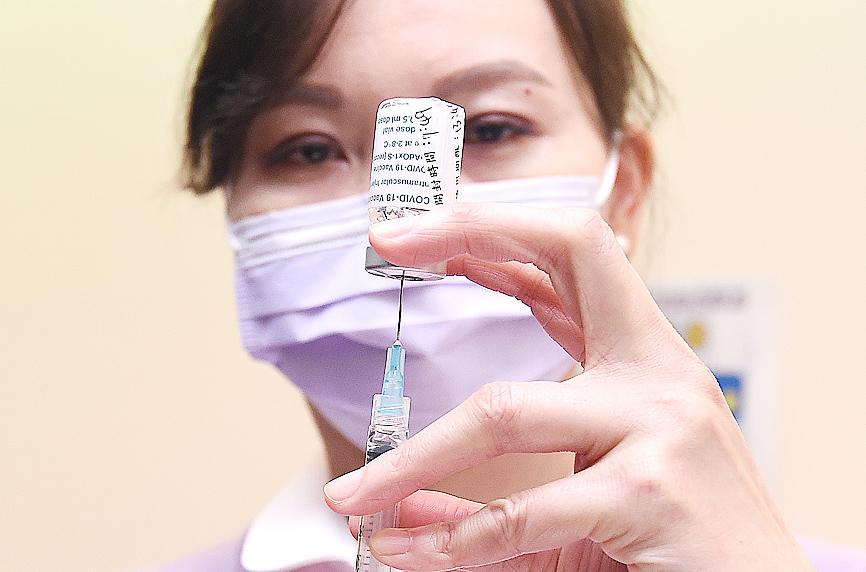Athletes who have qualified to compete in the Tokyo Olympics yesterday started receiving their first dose of the AstraZeneca COVID-19 vaccine, the Central Epidemic Command Center (CECC) said.
The nation started its vaccination program on Monday, with frontline healthcare workers at designated hospitals receiving the first jabs.
Tokyo Olympics qualifiers have also been given first priority for vaccination, Centers for Disease Control (CDC) Deputy Director-General and CECC spokesman Chuang Jen-hsiang (莊人祥) said.

Photo: Liao Chen-huei, Taipei Times
The Tokyo Olympics are scheduled to open on July 23.
The CECC hopes that athletes and national team staff members can complete the two doses before heading to the competition, he said.
As of noon yesterday, a total of 1,578 people had received the vaccine, Chuang said, adding that the number was relatively low on the first day because it is a new vaccine in Taiwan, and hospitals need some time to test their standard procedures.
Healthcare workers took turns getting the jab to avoid a staff shortage in case some were to experience side effects, such as a fever, after being inoculated, he said.
One non-severe adverse reaction was reported — a healthcare worker in northern Taiwan who developed a fever and felt tired after being vaccinated, he said.
The legal definition of a severe adverse event includes situations such as death, life-threatening conditions, permanent disability, congenital anomaly, hospitalization or prolonged hospitalization, and other conditions that might result in permanent injuries, CDC physician Lin Yung-ching (林詠青) said.
A non-severe adverse event is defined as having the common side effects of vaccination, such as a fever, swelling or pain at the injection site, tiredness and a headache, he said.
People should not worry about developing a fever after vaccination, as it is likely the result of the immune system being activated, he said.
The CECC reported one imported case of COVID-19 yesterday — a Dutch man in his 20s.
The man arrived from the Netherlands on Feb. 8, and tested negative in a paid test on Feb. 23, but another test taken on Sunday came back positive, Chuang said.
The man’s test result implied a low viral load, with the latest test on Monday coming back negative, Chuang said.
His antibody test came back negative for immunoglobulin M antibodies and positive for immunoglobulin G antibodies — implying a past infection, Chuang said.
The man might have contracted the disease abroad some time ago and has a lower risk of infecting others, the CECC said.
In other news, the CDC reported the first imported case of Chikungunya fever this year — an Indonesian man in his 20s who on Tuesday last week arrived in Taiwan for work.
The man was tested for dengue fever at the airport as he had a fever when he arrived, and was later tested for COVID-19 and Chikungunya fever at a hospital, CDC Epidemic Intelligence Center Director Guo Hung-wei (郭宏偉) said.
The man has been hospitalized for treatment, Guo said, adding that two people who arrived in Taiwan with him have not developed any symptoms.
Additional reporting by Wu Po-hsuan

AIR SUPPORT: The Ministry of National Defense thanked the US for the delivery, adding that it was an indicator of the White House’s commitment to the Taiwan Relations Act Deputy Minister of National Defense Po Horng-huei (柏鴻輝) and Representative to the US Alexander Yui on Friday attended a delivery ceremony for the first of Taiwan’s long-awaited 66 F-16C/D Block 70 jets at a Lockheed Martin Corp factory in Greenville, South Carolina. “We are so proud to be the global home of the F-16 and to support Taiwan’s air defense capabilities,” US Representative William Timmons wrote on X, alongside a photograph of Taiwanese and US officials at the event. The F-16C/D Block 70 jets Taiwan ordered have the same capabilities as aircraft that had been upgraded to F-16Vs. The batch of Lockheed Martin

GRIDLOCK: The National Fire Agency’s Special Search and Rescue team is on standby to travel to the countries to help out with the rescue effort A powerful earthquake rocked Myanmar and neighboring Thailand yesterday, killing at least three people in Bangkok and burying dozens when a high-rise building under construction collapsed. Footage shared on social media from Myanmar’s second-largest city showed widespread destruction, raising fears that many were trapped under the rubble or killed. The magnitude 7.7 earthquake, with an epicenter near Mandalay in Myanmar, struck at midday and was followed by a strong magnitude 6.4 aftershock. The extent of death, injury and destruction — especially in Myanmar, which is embroiled in a civil war and where information is tightly controlled at the best of times —

China's military today said it began joint army, navy and rocket force exercises around Taiwan to "serve as a stern warning and powerful deterrent against Taiwanese independence," calling President William Lai (賴清德) a "parasite." The exercises come after Lai called Beijing a "foreign hostile force" last month. More than 10 Chinese military ships approached close to Taiwan's 24 nautical mile (44.4km) contiguous zone this morning and Taiwan sent its own warships to respond, two senior Taiwanese officials said. Taiwan has not yet detected any live fire by the Chinese military so far, one of the officials said. The drills took place after US Secretary

THUGGISH BEHAVIOR: Encouraging people to report independence supporters is another intimidation tactic that threatens cross-strait peace, the state department said China setting up an online system for reporting “Taiwanese independence” advocates is an “irresponsible and reprehensible” act, a US government spokesperson said on Friday. “China’s call for private individuals to report on alleged ‘persecution or suppression’ by supposed ‘Taiwan independence henchmen and accomplices’ is irresponsible and reprehensible,” an unnamed US Department of State spokesperson told the Central News Agency in an e-mail. The move is part of Beijing’s “intimidation campaign” against Taiwan and its supporters, and is “threatening free speech around the world, destabilizing the Indo-Pacific region, and deliberately eroding the cross-strait status quo,” the spokesperson said. The Chinese Communist Party’s “threats